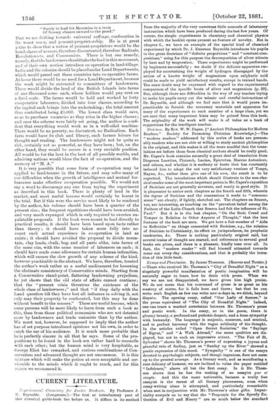Stoicism. By Rev. W. W. Capes. (" Ancient Philosophies fcr
Modern Readers." Society for Promoting Christian Knowledge.)—The "modern readers" addressed by this series of books are presum. ably readers who are not able or willing to study ancient philosophies
in the original, and this makes it all the more needful that the trans- lations set before them from classical authors should be really good.
Mr. Capes's book contains naturally a great deal of translation from Diogenes Laertius, Plutarch, Lucian, Epictetas, Marcus Antoninus, and others, and whether it is modesty or haste that has constantly induced him to adopt the not very satisfactory versions of Yonge, Mayne, &c., rather than give one of his own, the result is to be regretted. The translations which should illustrate to the non-clas- sical reader some of the most important points in Mr. Capes's exposition of Stoicism are not generally accurate, and rarely in good style. It is pleasanter to notice such chapters as the fourth and fifth, wherein the rigour of Stoicism and the concessions it made to " common• sense" are clearly, if lightly, sketched out. The chapters on Seneca, too, are interesting, as touching on the "prevalent belief among the Fathers of the Latin Church that Seneca had felt the influence of St.
Paul." But it is in the last chapter, "On the Stoic Creed and Temper in Relation to Other Aspects of Thought," that the best features of the book are seen. We get here a fair number of "Aids
to Reflection" on things connected with Stoicism, e.g., the relation, of Stoicism to Christianity, its effect on jurisprudence, its prophetic-
tendencies, &c. There is nothing particularly original said, but several trains of thought are started, and references to several good books are given, and there is a pleasant, kindly tone over all. In
fact, the " modern reader " will find himself attracted towards some not every-day considerations, and that is probably the inten- tion of this little book.


































 Previous page
Previous page